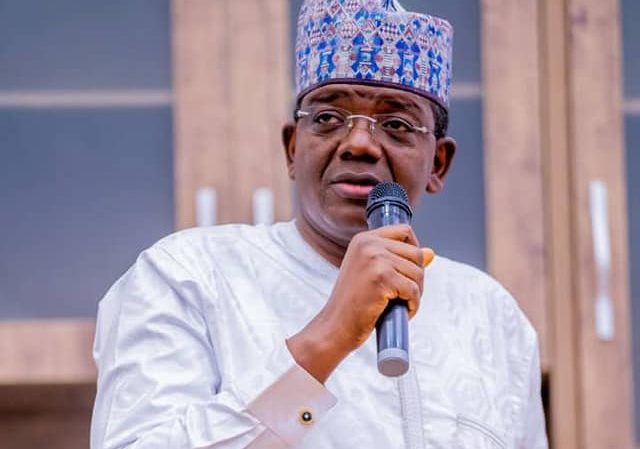The Clash of Perspectives: Matawalle vs. Amaechi on Nigerian Politics
The Nigerian political landscape recently witnessed a verbal clash between Bello Matawalle, the Minister of State for Defence, and Rotimi Amaechi, the former Minister of Transportation, sparked by Amaechi’s scathing remarks about the nature of politics in Nigeria. Speaking at a National Conference on Strengthening Democracy, Amaechi painted a bleak picture of Nigerian politicians, accusing them of being motivated by self-interest, driven by a lust for power, and resorting to violence and manipulation to maintain their grip on authority. He argued that politicians exploit the short memory and susceptibility of the electorate, manipulating them with rhetoric and inducements to secure their votes. Amaechi’s assertion that President Tinubu and the established political class would fiercely resist ceding power to the younger generation further fueled the controversy. His words resonated with a sense of cynicism and disillusionment, reflecting the concerns of many Nigerians about the integrity and accountability of their political leaders.
Matawalle swiftly responded to Amaechi’s comments, characterizing them as reckless, inflammatory, and dangerous, particularly in a period where the government is striving to consolidate national unity and security. He emphasized that power in a democracy is earned through legitimate means, not through intimidation, violence, or lawlessness. Matawalle underscored the Tinubu administration’s commitment to upholding peace, democratic values, and security for all citizens, contrasting this with Amaechi’s portrayal of a power-hungry political elite. The Defence Minister’s response aimed to reassure the public and project an image of a government dedicated to stability and the rule of law.
The core of the disagreement revolves around the fundamental nature of Nigerian politics. Amaechi, drawing from his own experiences within the political system, presented a starkly pessimistic view, highlighting the prevalence of self-serving politicians who prioritize personal gain over the welfare of the people. He essentially argued that the system is rigged against genuine democratic progress, with established politicians clinging to power through any means necessary. Matawalle, on the other hand, defended the current administration’s commitment to democratic principles, portraying Amaechi’s comments as an irresponsible attempt to incite unrest and undermine national unity. This clash of perspectives reflects the deep divisions and contrasting narratives within Nigerian society regarding the state of its political landscape.
The exchange between Matawalle and Amaechi also highlights the broader debate about intergenerational political transitions in Nigeria. Amaechi’s assertion that the older generation of politicians would not willingly relinquish power resonated with the anxieties of many young Nigerians who aspire to greater political participation. This concern reflects a growing desire for change and a frustration with the perceived stagnation of the political system. Matawalle’s response, however, did not directly address this issue, focusing instead on condemning Amaechi’s tone and emphasizing the government’s commitment to stability. This omission could be interpreted as a tacit acknowledgement of the challenges surrounding political succession and the resistance of established elites to change.
The public reaction to this verbal sparring has been divided, mirroring the polarized nature of Nigerian politics. Some echoed Amaechi’s sentiments, expressing their frustration with the perceived corruption and self-serving nature of many politicians. Others sided with Matawalle, criticizing Amaechi for his inflammatory rhetoric and potential to incite unrest. This divided response underscores the deep-seated mistrust and cynicism that pervades Nigerian politics, making it difficult to achieve a consensus on the way forward.
The implications of this public disagreement extend beyond the immediate exchange between the two politicians. It highlights the fragility of democratic institutions in Nigeria and the challenges of fostering a culture of open dialogue and peaceful transitions of power. The incident underscores the need for greater transparency and accountability in government, as well as a genuine commitment to addressing the concerns of the younger generation who yearn for a more inclusive and responsive political system. Ultimately, the debate sparked by Amaechi’s remarks serves as a reminder of the ongoing struggle to strengthen democracy in Nigeria and the need for continuous vigilance against those who seek to undermine its foundations.














